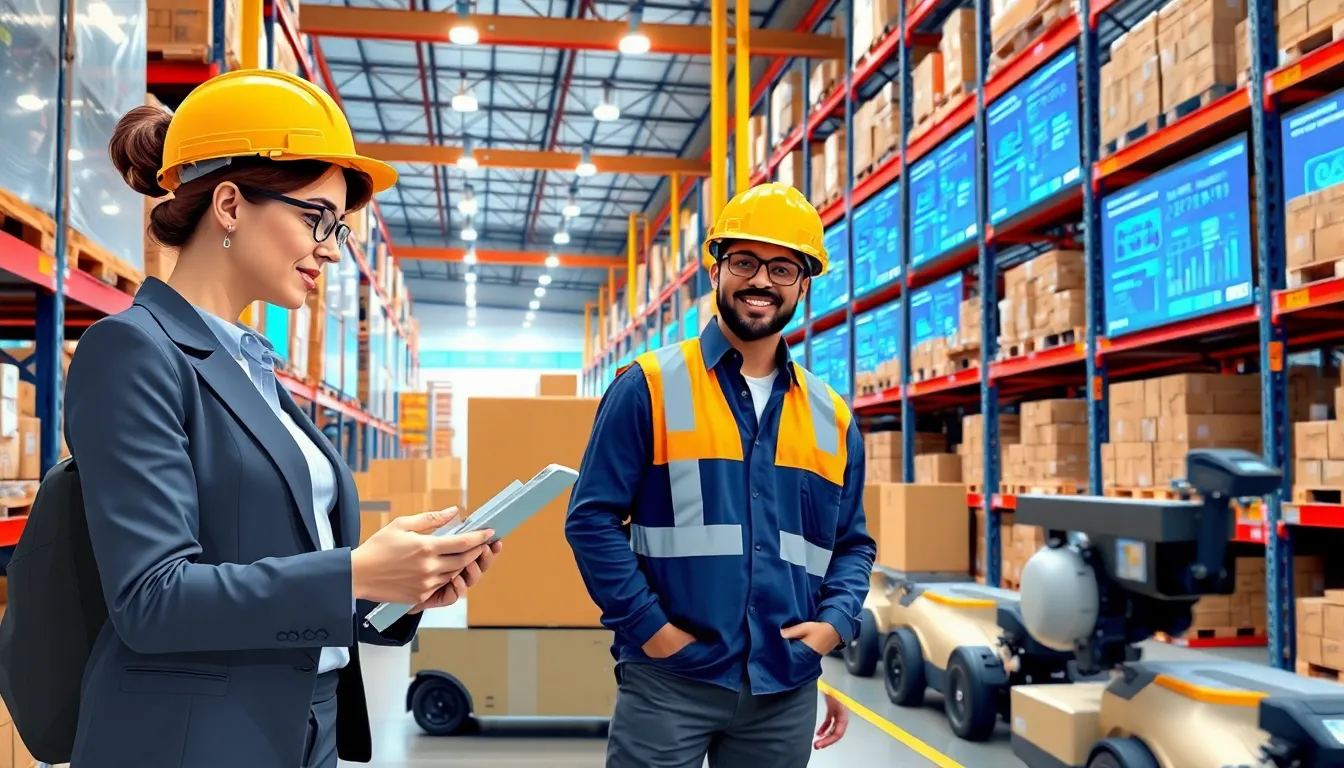In a world where packages travel faster than a cheetah on roller skates, AI-powered logistics is the secret sauce making it all happen. Gone are the days of guessing where your shipment is or when it’ll arrive. With artificial intelligence at the helm, logistics companies can predict, optimize, and streamline operations like never before.
Table of Contents
ToggleOverview of AI-Powered Logistics
AI-powered logistics encompasses a variety of technologies that enhance operational efficiency within the shipping industry. Companies utilize machine learning algorithms to analyze vast amounts of data, delivering insights that drive better decision-making. Predictive analytics allows logistics firms to forecast demand trends accurately and manage inventory levels effectively.
Robot automation plays a crucial role in warehouses, reducing manual labor and increasing productivity. Self-driving vehicles streamline transportation, optimizing routes and cutting delivery times significantly. Through real-time tracking systems, businesses gain visibility over shipments, minimizing delays and fostering transparency.
The integration of AI also improves customer service. Chatbots provide immediate support, addressing inquiries around the clock. These intelligent systems enhance communication between logistics providers and clients, facilitating seamless interactions.
Fraud detection mechanisms powered by AI safeguard against potential losses. Anomaly detection algorithms identify suspicious activities, enabling swift responses to mitigate risks. Implementing these measures boosts overall security in logistics operations.
Collaboration tools utilizing AI allow teams to coordinate effectively. Enhanced data sharing capabilities improve teamwork, ensuring everyone is aligned on project goals. As companies adapt to AI advancements, continuous learning becomes essential, helping them stay competitive in an evolving market.
AI-powered logistics not only streamlines processes but also supports sustainability efforts. Companies can optimize transportation routes to reduce fuel consumption and lower carbon footprints. Thus, AI fundamentally transforms the shipping landscape, making it more efficient, responsive, and environmentally friendly.
Key Technologies in AI-Powered Logistics

AI-powered logistics employs various technologies that enhance operational effectiveness. Machine learning and automation play crucial roles in optimizing logistics processes.
Machine Learning Applications
Machine learning models analyze vast data sets, yielding insights that improve decision-making. Predictive analytics enhances demand forecasting accuracy, ensuring better inventory management. Algorithms process past sales data, recognizing patterns that inform future purchasing trends. Companies find it easier to minimize stockouts and reduce excess inventory through these insights. Furthermore, machine learning enhances delivery route optimization, reducing transit times and addressing potential bottlenecks.
Automation in Supply Chain Management
Automation streamlines supply chain operations, reducing reliance on manual labor. Robotic systems, deployed in warehouses, manage inventory movements efficiently. These robots perform picking, packing, and shipping tasks quickly, which increases throughput. Additionally, automated vehicles navigate transportation routes autonomously, lowering delivery costs and enhancing safety. Integrating automation tools promotes responsiveness and flexibility in the supply chain, allowing companies to adapt swiftly to changing market demands.
Benefits of AI-Powered Logistics
AI-powered logistics offers numerous advantages, fundamentally enhancing the efficiency of operations and reducing costs.
Efficiency and Speed
Speedy decision-making becomes possible with AI-driven data analytics. Algorithms process vast amounts of data instantly, enabling quick adjustments to logistics plans. Companies experience improved inventory management through accurate demand forecasting, reducing stockouts and excess inventory. Delivery route optimization minimizes transit times, allowing for timely arrivals at destinations. Enhanced visibility into shipments via real-time tracking systems prevents delays. Firms can respond rapidly to market fluctuations, adapting logistics strategies based on real-time insights, which contributes to overall operational efficiency.
Cost Reduction
Cost savings result from the integration of automation in logistics operations. Automated vehicles and robotic systems in warehouses streamline processes, significantly lowering labor expenses. Companies that utilize AI-driven predictive analytics avoid overstocking and reduce waste, further enhancing profitability. Optimized transportation routes minimize fuel consumption, contributing to lower operational costs. With improved load planning and route efficiency, companies can maximize delivery effectiveness while cutting unnecessary expenses. AI’s ability to detect inefficiencies also prevents financial losses, ensuring a healthier bottom line overall.
Challenges in Implementing AI-Powered Logistics
AI-powered logistics introduces significant challenges that companies must address for successful implementation.
Data Privacy Concerns
Data privacy emerges as a primary concern with AI-powered logistics. Companies collect vast volumes of personal and operational data, raising issues about the protection of sensitive information. Regulatory compliance with laws such as GDPR becomes crucial. Additionally, companies must ensure their AI systems secure this data against breaches, which can lead to financial and reputational damage. Stakeholders often voice worries about data misuse and the potential for unauthorized access. Companies that prioritize information security can mitigate these risks and bolster customer trust while maintaining compliance.
Integration with Existing Systems
Integrating AI solutions with existing logistics systems creates both hurdles and opportunities. Many companies have legacy systems that may not easily accommodate new technologies. Transitioning to AI requires substantial investment in both time and resources. Challenges arise from data silos, where information fails to flow seamlessly between systems. Successful companies often evaluate compatibility before implementing AI solutions. They may choose to upgrade or replace outdated infrastructure to reap the full benefits of AI’s capabilities. Addressing these issues promotes smoother integration, facilitates data sharing, and enhances overall efficiency in logistics operations.
Future Trends in AI-Powered Logistics
AI-powered logistics continues to evolve, promising exciting advancements in numerous areas. Companies are increasingly adopting innovative technologies to enhance efficiency and effectiveness.
Predictive Analytics
Predictive analytics utilizes historical data to forecast future trends in logistics. Enhanced demand forecasting improves inventory management, minimizing stockouts and excess stock. Machine learning algorithms analyze vast data sets, recognizing patterns in historical purchasing behavior. By predicting customer demand accurately, businesses can optimize replenishment schedules, reducing costs and improving service levels. Companies gain a competitive edge as they swiftly adjust to market fluctuations, ensuring timely deliveries.
Autonomous Delivery Systems
Autonomous delivery systems represent a significant trend in the logistics sector. Self-driving vehicles navigate routes independently, transforming transportation efficiency. These vehicles reduce labor costs and enhance safety by minimizing human error. Furthermore, drones and automated ground vehicles deliver packages quickly, catering to consumer demand for rapid service. Companies incorporating these technologies benefit from reduced operational costs and improved delivery times, ultimately enhancing customer satisfaction. Adoption of autonomous solutions advances the logistics industry into a new era of operational excellence.
AI-powered logistics is reshaping the shipping industry by driving efficiency and responsiveness. With advanced technologies like machine learning and automation, companies can optimize operations and enhance customer service. Real-time tracking and predictive analytics are key components that minimize delays and improve inventory management.
While challenges such as data privacy and system integration exist, the benefits far outweigh the hurdles. Companies that embrace AI will not only streamline their logistics processes but also contribute to sustainability efforts by reducing their carbon footprints. The future of logistics is bright with AI at the forefront, promising increased operational excellence and improved customer satisfaction.





